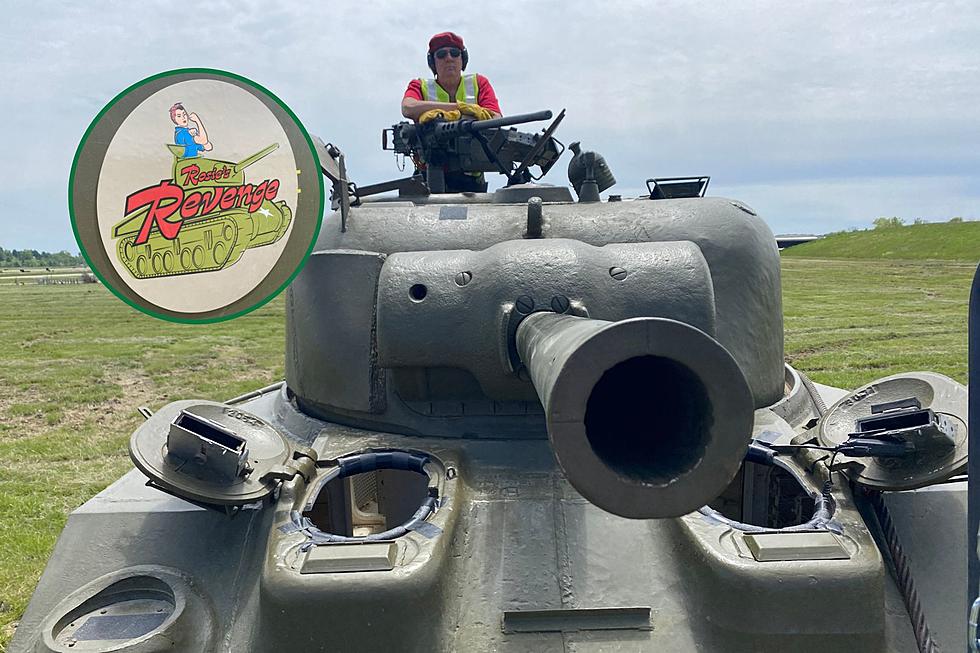
Take a Ride in a World War II Era Sherman Tank at This Indiana War Museum
The Evansville Wartime Museum is giving you the opportunity to experience what soldiers fighting German and other Axis Powers forces experienced on the battlefields during World War II (without any of the danger) by letting your ride in a Sherman Tank that was once used during the war.
Evansville's Involvement in the World War II Effort
Evansville has a long and rich history with World War II. From the onset of America's involvement, the factory that would eventually become the Whirlpool plant at the intersection of Highway 41 and St. George Road, built over 6,500 P-47 Thunderbolt fighter planes, the U.S. Navy operated a shipyard along the Ohio River that built LST ships used to transport troops and vehicles to the battlefield, and multiple factories at the time switched from producing their normal products to making ammunition. The city was such a vital part of the war effort, it was one of only 18 cities in the country to receive the designation of an American World War II Heritage City by the National Parks Association in 2022.

Evansville Wartime Museum Offering Rides in a Sherman Tank
Much of the city's World War II history is on display inside the Evansville Wartime Museum on Petersburg Road, just east of the intersection with Highway 41. The museum features a variety of different artifacts from the war on display, including one of the P-47 Thunderbolts built at the former Whirlpool plant.
The museum's newest addition to its impressive collection is an operational M4A4 Sherman Tank. While the tank was not made in Evansville, the city's former Chrysler automotive plant did rebuild and refurbish over 1,400 Shermans sent in from training camps around the U.S., according to information provided by the museum.
Named "Rosie's Revenge," the museum acquired the tank from the Museum of the American G.I. in Texas in 2022. It was built in February 1943 and has been given a couple of refurbishments after being found on a range in Britain. The original engine was replaced with a smaller one that is easier to maintain, it was given a fresh coat of paint, and given markings to identify it as "the 12th tank of the 66th Armored Regiment."
The museum is offering visitors the opportunity to take a ride inside Rosie, which I recently took advantage of. As you can imagine, it's a loud and bumpy ride. It's definitely not a vehicle you'd take on a road trip, but it was an awesome ride nonetheless.
The tank has seating for five people. During the war, those five people would be the commander who sat in the turret on top (where I am in the picture above), a gunner who sat below the commander in the turret who could control the direction of the turret and the elevation of the turret gun, a driver who sat in the front left side, a secondary or "bow" gunner who sat in the front right and fired a .30 caliber machine gun, and finally at loader who sat near the primary gunner and supplied the ammunition.
The museum doesn't allow you to have your cell phone on you when you ride because there are too many crevices it could fall into if you drop it or it falls out of your pocket, so I don't have any video of the ride itself. However, I was allowed to take a few pictures afterward once the tank had come to a complete stop and the engine was shut off.
This is a look at the inside of the turret from above. The square pad is the gunner's seat. The binocular-looking contraption directly in front of it is what the gunner would look through to aim the main gun, the back of which is the object to the left of the seat. There are also controls for the gun's elevation and turning the turret.
Mounted to the wall above the gunner's seat is a small, round pad that looks like the top of a bar stool which is where the commander would sit. The seat is mounted high enough that his head and shoulders would be outside the turret.
Staying inside the turret, on the other side of the gun is where the loader would be stationed. Behind them along the wall would be live rounds for the gun, held in place by spring-loaded clamps. When called for, the loader would remove a shell and load it into the main gun.
Obviously, there are no windows on a Sherman Tank, so both the gunner and the loader would look through periscopes mounted in front of them to see outside. But as you can see from the photo below, even that view was severely limited. Here's a look at the full periscope in front of the loader position. Fortunately for them, the designers were nice enough to put a thick rubber pad above the viewing area so they wouldn't knock themselves unconscious while the tank was moving.
This picture doesn't quite do it justice, but here's a close-up to show just how limited the view through the periscope is.
The front where the driver and bow gunner sit is separated from the turret by metal with several holes punched in it, similar to what is shown behind the artillery mounts in the picture above. While it's hard to see in the photo below, there is no steering wheel. Instead, the tank is controlled through the use of levers. To the right of the driver is where the bow gunner sits. Both the driver and the bow gunner get in and out of their seats through a 26-inch diameter opening directly above them.
How to Book a Ride on the Evansville Wartime Museum's Sherman Tank
While the pictures I took give you a small idea of what it's like inside the tank, you really need to go for a ride yourself to truly appreciate what soldiers experienced during the war. The museum offers rides on the first Saturday of every month for $100 per person. The 30-minute experience includes a safety briefing and the history of the Sherman Tank before you climb aboard and go for a spin on the grass field next to the museum.
Rides can be booked through the museum website.
